Back in 2002 Jesus Dapena published some photos of Renault FT-17 Tanks in the Rif War; photos taken by Lieutenant Cipriano Briz (“Uncle Cipri”). I thought they were cool, got in contact with Jesus, and linked to his material from my Rif War pages (Timeline; Painting Guide; Sources; Orbat). Recently Jesus got in touch with me to explain that his site has now disappeared. Jesus kindly shared the content with me so I could republish them. All words and photos by Jesus.
Cipriano Briz in a Machine Gun Company
My mother’s cousin Cipriano Briz ("uncle Cipri") was stationed in the Spanish Protectorate in Morocco in the 1920’s during the Rif War (called in Spain “La Guerra de Africa” or “La Guerra de Marruecos”). He was in the infantry.


Cipri was born in 1894. The photo shows him at Zoco El Telata de Yebel Hebib, at the western edge of the western war zone, on June 2, 1921. (NOTE: By clicking on some of the photos, you can see larger versions.) At the time, he was a lieutenant in a machine gun company of the Ceuta 60th Infantry Regiment. From July 6 to July 16 of 1921, his regiment was part of the “Columna del Jarrub” force that penetrated eastward from Megaret deep into the interior of the Yebala region to Zoco El Jemis de Beni Aros.
Later in the year, his regiment was moved to Buharrax, on the eastern edge of the western war zone, from where it again penetrated into the Yebala region, this time westward. On the first day of this offensive, December 19, 1921, Cipri was shot in the left thigh near Ayalia. He was with a machine gun crew, and the ammunition belt jammed. Cipri stood up, pressed with one foot on the machine gun, and pulled on the belt with his hands, trying to undo the jam. That is when he was shot.
Cipri was hospitalized and on leave until August of 1922.

Cipri’s Zeiss Turact 8×24 binoculars, manufactured in Germany in 1918. They were probably bought by Spain from the French government after the end of World War 1.
Cipriano Briz in Renault FT-17 unit
After he returned from leave Cipri was transfered to the Light Infantry Tanks unit of the Cadiz 67th Infantry Regiment, which was active in the eastern war zone. Cipri had poor circulation in his left leg for the rest of his life. This probably made it hard for him to endure long marches, and may have been the reason for his transfer to an armored unit.
Cipri’s unit was equipped with Renault FT-17 tanks. He sent this series of photos to Spain, presumably to his mother. The originals were printed on postcard stock.

FT-17 tank. The picture above is titled “My command tank”. On the back, it says:
Notice the elephant painted to the left of the machine gun: It’s the mascot.
This is the most difficult obstacle that a tank can face. This tank was almost burnt up by the Moors.
That’s why it has an X (which stands for “wounded”) in the white circle in the rear. It’s number 4, and number 1 in the Seccion.

FT-17 tanks including an FT-17 TSH for wireless communications. The picture above is titled “Tanks for protection of the convoy to Tizzi-Asa”. On the back, it says:
My little tank is the one marked by an arrow. Its cannon (sic) was hit by five bullets, and particles from two of them penetrated like a fine powder spray. This is funny after all! This photo was taken at Tafersit.
Notice the turtle mascot painted on the turret of Cipri’s tank.
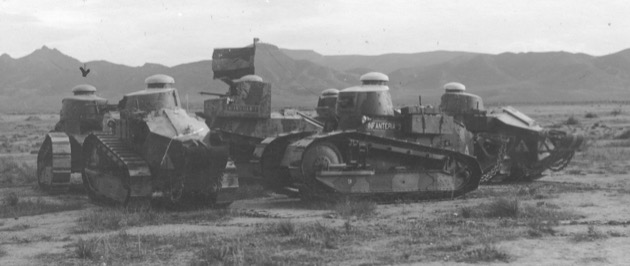
FT-17s and FT-17 TSH tank. Cipri’s tank is not the one marked by the arrow, but the second one from the left. Notice in the enlarged photo that it has Cipri’s turtle painted on the left side of the turret.


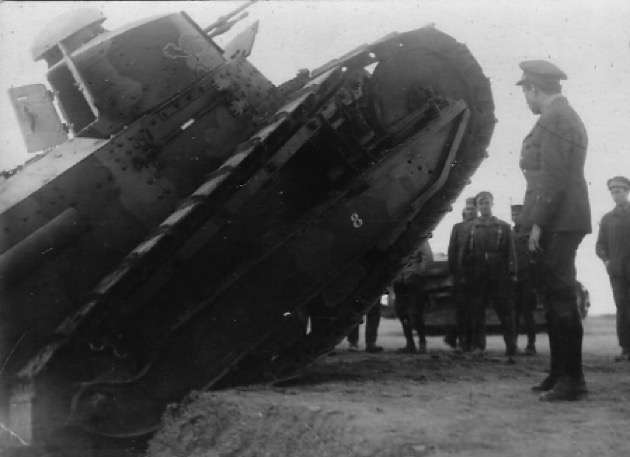
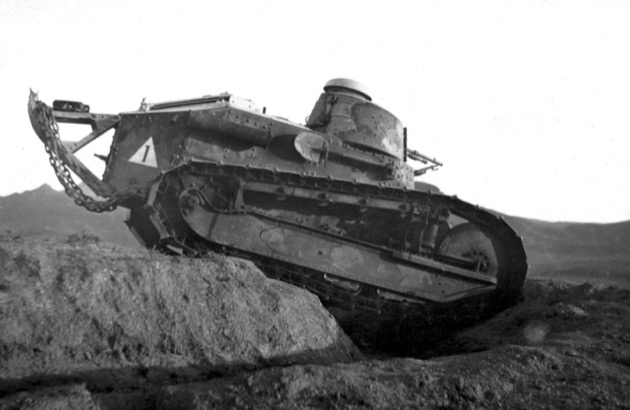
FT-17 tanks. Notice in the last two photos the turtle mascot painted on the turret of the tank identified by a number “8” painted in white on the horizontal beam of the traction gear. This is obviously Cipri’s tank again.
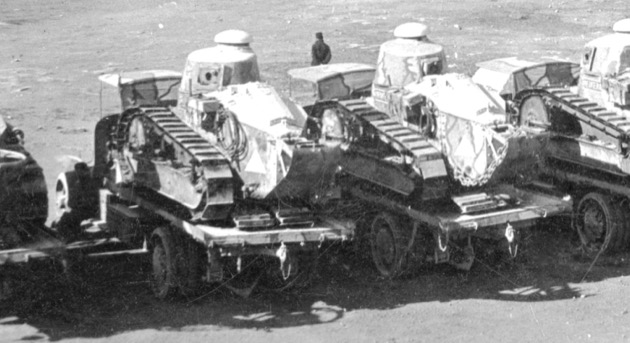

FT-17 tanks. On the back of the picture, it says:
As you can see, it’s impossible not to love these tanks (mounted on their transport trucks), because they are so beautiful. In the background you can see the town of Dar-Drius, a much larger camp than Riffien, and more comfortable.



FT-17 TSH tank.


FT-17 TSH tank. On the back of the picture above, it says:
The telegraph and wireless telephone tank that I already sent to you before, but the position is not the same. Here it’s further along over the edge of the breastwork from which it’s going to drop. This was published in ‘Nuevo Mundo’.

Links to other Webpages on the Renault FT-17
Renault FT-17 and Schneider M16 CA1 Tanks in the Rif War
Once inside, go to the page on Spanish tanks.
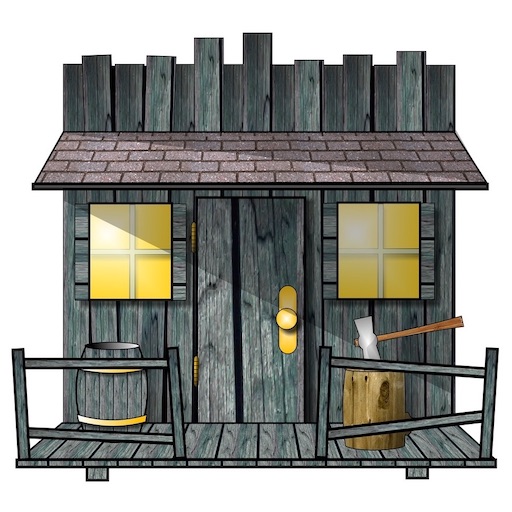

The forth photo from the bottom where a man in an over coat is walking by the tank and there is a man peering out of the hatch. The paint on the turret looks like a tree with a cat dangling from a branch on the right and a mouse dangling from a branch on the left? Any thoughts? If so it follows the animal theme. Thanks for sharing
Ok maybe not a mouse and maybe the cat I see is just paint run? Sorry for any confusion.
Yea it’s paint run, sorry about that. Just thought maybe because of the animal theme on the other tank.
Roy, don’t worry. Mistakes are easy when interpreting photos, particularly when black and white. I recall a rather strange conversation about the colour of camouflage patterns on Panzers during the Spanish Civil War – our only resources at the time were black and white photos. It was pretty hard to draw any clear conclusions.